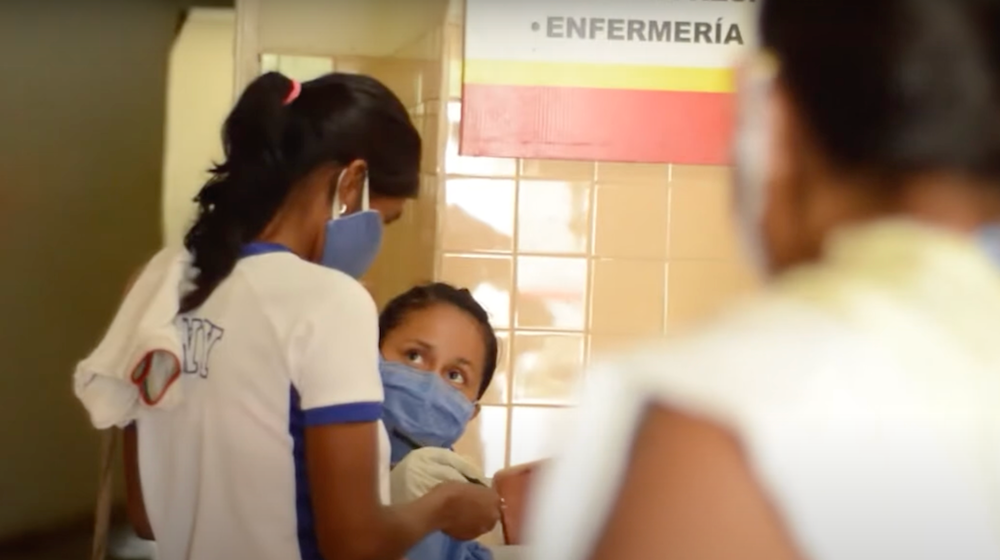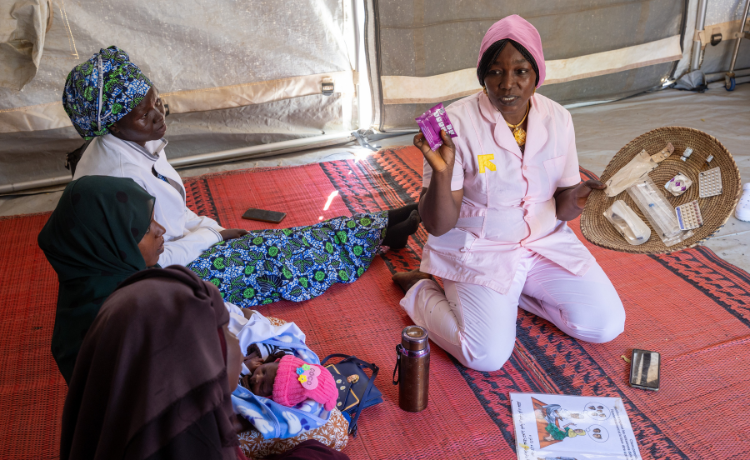News
Explainer: How does family planning save lives?
- 06 February 2025
News
UNITED NATIONS, New York – When a war forcibly displaces tens of thousands of people, UNFPA, the United Nations sexual and reproductive health agency, equips displacement camps and medical personnel with critical supplies – including condoms, oral and injectable contraceptives, contraceptives implants, and intrauterine devices.
When an earthquake tumbles whole city blocks, UNFPA puts contraceptives onto emergency relief convoys, alongside kits for delivering babies and medicines to stop internal bleeding. When a cyclone slashes through remote island communities, UNFPA sends contraceptives just as it sends sterile medical equipment.
Why? Because contraceptives are part of life-saving humanitarian care. This may be counterintuitive to some, but is settled fact in the eyes of medical science, humanitarian responders and women themselves. And because, even outside of emergency settings, having access to modern, safe contraceptives empowers women to make their own decisions about their fertility, which in turn reduces unintended pregnancies, unsafe abortions, improves health outcomes and lowers the risk of maternal and child mortality – saving the lives of millions.
People do not stop getting pregnant in emergency settings
![: A woman in a combat vest hands a blue bag of UNFPA supplies to a woman in a flowery dress]](/sites/default/files/inline-images/Untitled%20design%20%2831%29.png)
Even in the best circumstances, alarming proportions of women are unable to say no to sex – roughly a quarter of women, according to the most recent data available.
But in a humanitarian crisis, women experience roughly twice the rates of gender-based violence. They face the heightened risk of rape as a weapon of war and a tool of genocide, and also increast risk of intimate partner violence. All of this elevates their vulnerability to an unintended pregnancy.
Sakina Sani was married off when she was 12 years old – a child – amid conflict and food shortages in northern Nigeria. She became pregnant at 15, but miscarried, then had two children in rapid succession. “I will never allow my daughter to go through what happened to me,” she told UNFPA.
Family planning prevents fatal complications

More than 60 per cent of all maternal deaths are estimated to take place in humanitarian crises and fragile settings, places where women struggle to access the care and nutrition needed to safely carry a pregnancy. “Many women in north-west Syria lose their lives while being transferred between hospitals in the absence of essential supplies for critical conditions,” Dr. Ikram Haboush, in Idlib, Syria, told UNFPA.
Contraception is sometimes criticized —incorrectly — as a new medication, one that is unnatural or poorly understood. The truth is that contraceptives of various forms have existed for millennia: Condoms, for example, have existed for hundreds of years. When it comes to modern forms of contraception, they are among the most prescribed and well-studied medications in existence.
Contraceptives have been investigated not just by pharmacologists and medical researchers but also by healthcare economists, epidemiologists and policymakers, and the findings are conclusive: By preventing unintended pregnancy, contraceptives prevent women from dying.
How? Every pregnancy carries a risk, and pregnancies in crisis settings — where health systems are in tatters and medical care scarce — are particularly dangerous. Unintended pregnancies are also directly correlated with higher maternal mortality rates. “That is why every public health programme designed to reduce the number of maternal deaths incorporates contraception as one of the pillars of action,” experts state.
By preventing unintended pregnancy, contraceptives also reduce the incidence of maternal injuries and illness, stillbirth and neonatal death.
In 2023, UNFPA’s dedicated Supplies Partnership procured $136 million worth of contraceptives, which is estimated to have prevented nearly 10 million unintended pregnancies and over 200,000 maternal and newborn deaths. It is estimated these contraceptives also prevented nearly 3 million unsafe abortions.
Family planning prevents fatal illness and chronic ailments

Contraceptives like male and female condoms additionally save lives by decreasing the chances of contracting sexually transmitted infections (STIs), including HIV. Even a treatable STI can be life-threatening in settings with limited access to medical care – as is the case for women and girls in Haiti, for example, where widespread and relentless sexual violence has led to rising rates of unintended pregnancy as well as STIs, while the health system has all but collapsed.
Only around 3 per cent of survivors in Haiti report receiving post-rape treatment within 72 hours of being assaulted; this treatment includes emergency contraception to prevent pregnancy and post-exposure prophylaxis to prevent HIV transmission. Dr. Justilien, a psychologist at a UNFPA-supported hospital in the capital Port-au-Prince, explained how proper treatment by health workers includes “psychological support, emergency contraception, and testing for and treating sexually transmitted infections.”
Contraceptives also treat ailments unrelated to sexual activity: Various forms of contraception are widely prescribed to address ailments that are debilitating in even stable and secure circumstances — conditions like polycystic ovarian syndrome, endometriosis, dysmenorrhea and extremely heavy bleeding.
For women like Omaira Opikuko, Bolivarian Republic of Venezuela, there is no question that long-term contraception after her sixth delivery was life-saving. She suffered both haemorrhaging and a prolapsed uterus during her last labour. “I was on the brink of death,” she said.
A cost-effective humanitarian intervention
In 2023, more than 50 countries that received UNFPA contraceptive supplies made collective savings of over $700 million, through reduced healthcare costs for pregnancy, delivery and post-abortion care. Numerous studies have shown that family planning is a critical investment for society, not only by averting unintended pregnancy and the maternal health problems that accompany it, but by increasing education and employment gains among women, too.

In humanitarian settings, contraceptives are all the more critical, helping women and families survive and stabilize, and leaving them better prepared to recover.
No one knows this better than survivors of humanitarian crises themselves: “There is a lot of demand for family planning services,” one emergency responder told UNFPA in the immediate aftermath of a deadly cyclone.
Amid the world’s growing precarity, rising catastrophes and increasing displacements, these services are a light in the dark for women and girls. As Ms. Opikuko in Venezuela said: “I don’t want to be scared anymore.”